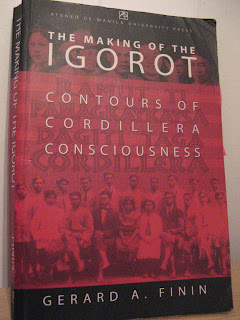
I was struck by the ideas presented by Gerard Finin in his book The Making of the Igorot: Contours of Cordillera Consciousness while reading it this morning for a paper I need to write. Couldn't help but share it. What do you think of the following paragraphs?
Crucial in the formulation of American plans for bringing "civilization" to the Cordillera and making highlanders a more integral part of the already largely Hispanized lowland Philippines was the view that all of the "natives" were basically "the same." Establishment of a distinctive administrative grid in the Cordillera was not the product of a grand plan for divide and rule designed to put highlanders against lowlanders. Rather, it was based more on prevailing American conceptions about "types" of people and a strong desire for a "rational" system of administration based on "scientifically" justifiable principles for overseeing highlanders.
This thinking drove the American officials who imposed the colonial structure on Luzon's largest highland territory. From the plans and policies that were devised and implemented during the early part of the 1900s emerged the spatial and social dimensions of the shared pan-Cordillera regional consciousness that so strongly influences the Cordillera today (italics mine). Before discussing what American rule bequeathed, however, it is important to consider the conditions preceding the American presence. (pp. 19-20)
From Chapter 5:
In keeping with the long-range plan to unite highlanders and, in time, assimilate Mountain Province into lowland Philippine society, American officials early in the century began introducing features of American-style democracy. The establishment of Mountain Province's local governments was key to this effort. As yet another element of the grid, it changed highlanders' consciousness in terms of the way they thought about themselves and those around them. (p. 108)
These paragraphs basically sum up what the book is all about: how the American colonial government in the early 1900s were able to create a region in the highlands - unlike the Spaniards who miserably failed to penetrate it - which has then led to the emergence of a pan-Igorot consciousness. He then goes on to write (and illustrate with some examples) that due to this American legacy, highlanders have learned to identify with one another, despite their different tribal or ethnic groupings - a rather picture-perfect image of a united Igorotlandia. Hmmm...
Just before coming here, my Bicolano historian friend who read it kidded me saying, 'Hey, you should thank the Americans because they gave you your Igorot identity'. Huh? It's a must-read for those interested in Cordillera studies.
I actually have a signed copy of this book as I was there at UP Baguio when Gerard Finin launched his book. I found him a warm, charming scholar who was sincerely interested in the Cordillera. He stayed in Abra for two years as a young Peace Corps volunteer and he still speaks Ilocano fluently. But now that I am reading his book, I realize that it's almost impossible to look at the world and analyse events without bringing in your socio-cultural background into the picture. But I must say that some of his analyses are patronizing. He may be an academic but then he is first and foremost an American who is looking at us, Igorots, with an American perspective. I guess Bakhtin is right: we always speak from a particular position.
Some questions:
Without the Americans, would our forebears not learn to live with one another and respect each other's rights despite their different tribes/ethnic groups, languages, and culture?
Would we have never learned to govern ourselves and advance as a people, at least politically and socially? (Except for Benguet, economically, our leaders still have a lot of work to do to bring us out of the country's list of 20 poorest provinces)
Sadly, we would never find out the answers to these questions because the Americans came into the picture and that's that. We cannot undo what actually happened. But we can create a clearer picture by bringing in more voices into the narrative of the making of Igorot consciousness. How I wish we could find out more how early Igorots saw the world during their time. Maybe we could start asking our own parents' stories who may be in their 70s, 80s, or even 90s. It's never too late to write the stories of ordinary, average, working class Igorots. I am certain their narratives are rich and meaningful despite their lack of education, money or power.
Links: Blast from the Past
Ateneo de Manila University Press

